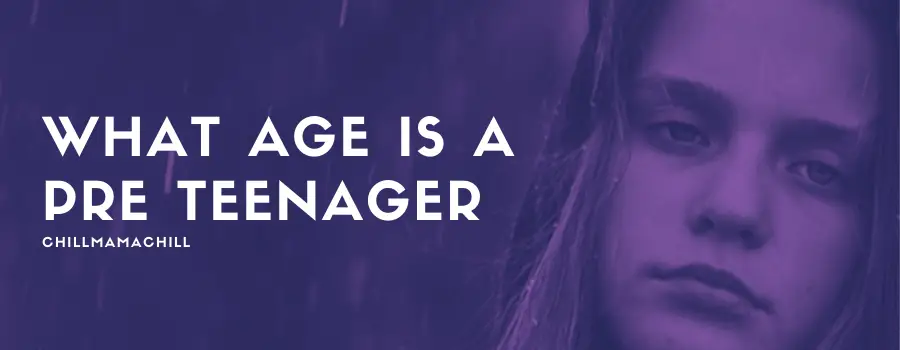At what age is a pre-teenager? This is a question that many people will ask, especially parents or carers looking after young children. Most preteens will be aged between 9 and 12 years old.
I’ll be honest, I don’t know who coined the phrase “pre-teenager”, but it is a presumptuous label to slap on children before they hit puberty. The reason why? Children are not one-dimensional people who can fit into a simple label bracket. While some children will always remain preteens in my mind (for example, I can recall my young niece who is about seven years old but acts like someone twice her age sometimes), the label of pre-teenager is just too generalized to be taken seriously.
So what exactly makes children into preteens? Children are simply individuals that haven’t hit puberty yet. While there may be some commonalities in what makes a child grow up into a preteen, You can’t classify the severity of these factors.
What Developmental Milestones Make a Preteen?
One of the things that make children into preteens is development. Development in this sense relates to both physical and psychological changes in a child. The following are some examples of developmental milestones that make a child grow up into a preteen:
Development Through Puberty
Parents need to realize that even though children are not preteens, puberty is still a critical part of their lives. Puberty affects children in many ways, both physically and psychologically. Physical changes like the growth of hair (and the subsequent shaving of pubic hair) can cause a lot of confusion for kids because it’s usually something that parents don’t want to talk about.

Psychological changes like mood swings and social issues such as developing relationships (and how puberty impacts those) can also leave children feeling confused and somewhat alienated from their parents.
Having Different Interests
Another way of classifying children into preteens is by their interests. It’s important to realize that even though children may act like adults, they don’t necessarily want to be treated like them. Claims in this sense relate not only to activities but also what media (for example, TV shows) preteens are interested in.
Why is it Important to Treat Preteens Like Children?
It’s important not to forget that children are still children regardless if they can shave or their favourite show is about prostitutes at the end of the day. So why is it so essential to treat preteens like children? Here are a few reasons why:
Preteens have not yet developed a sense of independence, so it’s essential to provide guidance and support. Children are still learning about the world around them, so parents need to teach them as much as possible before they reach puberty. It’s important to remember that preteens are still children who are developing emotionally. While preteens may seem mature in their thinking, the emotional needs of children are still essential to take care of.
5 Signs That Your Child Has Entered Preteens
Here, we answer the question, “what age is a pre-teenager?” Some of the signs that your child has entered preteens are:
Your Child Pulls Away From You
One of the ways to identify children who have entered preteens is if they suddenly pull away from you. This means that while your child may still be affectionate towards you, they suddenly start acting more aloof and distant than usual.

They Start Self-Grooming
Children entering into preteens will often start self-grooming by doing things like shaving or picking at their eyebrows. What this means is that your child may still not quite look like an adult both physically and emotionally, but they’re starting to grow up in certain aspects.
They Become More Suspicious of You
One of the exciting changes children are entering into preteens often have is becoming more suspicious of you. This means that your child may start asking you a lot more questions about things like why you’re always on the computer or where certain items in the house are located. This suspicion isn’t an attack against you but rather a sign that your child wants to learn as much as possible about the world around them.
What They’re Interested In Changes
Another sign that your child has entered into preteens is that their interests change. This means that since children are still developing socially, they often do what other kids around them are doing to fit in. This means that if you have a son who used to love superhero movies, you might notice that he’s more interested in romantic comedies. This means that while your child may still be a kid, they’re trying out new things to learn about themselves and who they want to become.
They Want Privacy
One of the more critical changes that children entering into preteens often start doing is wanting privacy. What this means is that while your child may still want to spend time with you, they might start asking for things like their own room or asking not to be seen undressed.

This means that preteens are beginning to become more aware of themselves and who they are and what makes them unique.
So, What Age Is a Pre-Teenager?
I hope that this article answers the question, “what age is a pre-teenager?” This means that children who have entered into preteens will start to gravitate towards more independence while still wanting some guidance from their parents.
As a parent, it’s essential to understand the changes that your children are going through to adjust your parenting style according to what they need. Pre-teenage means that, while you might have a child who still cries when they skin their knee, you also have an independent student making some of their own decisions without parental influence.
What’s most important to remember when trying to answer the question, “what age is a pre-teenager?” is that while children do grow up and change both emotionally and physically, they’re still kids at the end of the day. What this means for parents with preteens is that even though your child may start doing certain things that are more adult-like, it’s essential to make sure they’re still comfortable being a kid.

I’m Cathrine and I’m a 39-year-old mother of 3 from Utica, New York. And I’m extremely happy you’ve come to visit my hide-out on the web. Here I post about everything related to family-life and usually it will involve babies and lessons I’ve learned over the years from experts, friends, and my own mistakes. So hopefully you will find what i write fun and informational!


